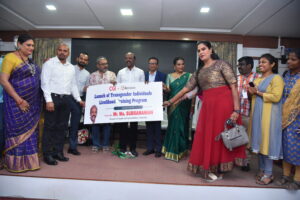Chennai: On January 23, the campus of Loyola College in Chennai hosted an event that is set to change the lives of the queer community for the better. This transformative initiative to empower livelihoods for LGBTQIA+ persons, designed by Sahodaran, the pioneer support group, in association with IT major CGI, aims to empower the community through ensuring financial security and social equality.
For the LGBTQIA+ community, a lack of acceptance and a dearth of opportunities have always been the main obstacles in the path to empowerment through employment. Discrimination based on sexual orientation and gender identity still continues even though there has been increased awareness of LGBTQIA rights over the recent years. Transgender persons have been subjected to bias during the selection process by employers, and harassment and unequal treatment by colleagues.
Now, much to the relief of the community, various agencies, organisations and state governments have brought in schemes and policies that support transgender persons with facilities and capacity building programmes.
Like Sahodaran, PeriFerry, Naz Foundation and several other organisations working for the community have created various upskilling and educational courses to fill the gap in the job prospects of transgender persons. From baking and tailoring to communicative English and computer applications, the range of topics that these programmes cover is both impressive and effective.
And, the response from the community has exceeded the expectations of the organisers.
PeriFerry, the organisation that facilitates sustainable livelihoods to transgender persons, has upskilled 600 trans individuals and helped more than 480 persons get placed in corporate jobs. And, Sahodaran’s first batch itself has brought in 300 participants for its Transgender Individuals Livelihood Training Programme which offers them both long-term and short-term skill development courses.
To reach out to a larger section of the community, the programme has allotted 50% seats to transgender persons and the rest to LGBQIA people.

Ma Subramanian, Minister of Health and Family Welfare, Tamil Nadu, launching the Transgender Individuals Livelihood Training Programme in Chennai ~Photo: Sahodaran
While the short-term courses that have a duration of one week to one month focus on skilling in a wide variety of areas like garland making, glass painting, mehendi art and various other crafts, the long-terms courses that go up to six months deal with training in computer application, baking, tailoring and beauty care.
‘’Our first priority is to help community members find jobs through upskilling. For those who are already employed, our courses will be beneficial for rising in their careers. For people engaged in sex work or begging, a training in basket making or other art and craft courses will ensure an additional income,’’ says Jaya, activist and general manager of Sahodaran.
Prior to curating the training modules, Sahodaran conducted a survey among the community to identify the courses in demand. Computer applications, tailoring, baking and beauty service topped the list. Interestingly, there was a request for coaching to become a priestess. Jaya and her team found a trainer for this job, and currently 20 women are learning the basics of this profession.
Of the 300 participants in the programme, 90 are pursuing long-term training while the rest have opted for courses of shorter duration. Some of the trainers are members of the community and it has helped make a difference.
‘’The response has been encouraging, and we are hopeful of changing lives by enabling them for jobs as well as self-employment, thanks to CGI coming up with this initiative for transgender persons and LGBQIA communities,’’ says Jaya.
Through this trendsetting initiative, Sahodaran hopes to help the transgender community break the social barriers that have forced its members to resort to prostitution and begging instead of venturing into professional jobs. This empowerment drive is effectively curated to not only change individual aspirations but also to transform the perceptions of the community as well as the society. It explores a variety of employment opportunities and throws open doors for the upcoming generation to dream big and live better.
For an inclusive workplace
PeriFerry has been actively involved in promoting diversity, inclusion and equal opportunity in the workforce right from its inception in 2017. Its Corporate Skills Training Program called Revive is specifically designed for transgender persons, enabling them to follow their passion and pursue sustainable careers.
The organisation offers its services across the country, and has offices in Bengaluru, Chennai and Pune. PeriFerry has two training centres in Bengaluru and Pune, and conducts training programmes through offline and online modes. Its training courses include professional English communication, digital literacy, financial literacy, soft skills and life skills. The organisation also helps with aptitude enhancement, resume building, Interview preparation and more.
‘’We have also sensiitsed 30,000 plus employees regarding an inclusive workplace. It is our responsibility to ensure that members of the community have access to employment opportunities and better livelihood,’’ says Anirudh Kumar, project co-ordinator of Revive, the one-of-a-kind residential corporate training programme created by PeriFerry.
Most of the trainees have found jobs in IT, tech, BFSI, pharma, manufacturing and retail sectors. The PeriFerry team is in touch with them even after placement, and holds meetings every six months, providing them with necessary support, and getting feedback on their work and workplace environment.
‘’The lives of trans people are never easy. They have to struggle a lot to survive, and our aim is to equip them with the skills to enhance their employability, and also to create a positive, inclusive workplace,’’ says Anirudh.
Upskilling for a better future
Many people in the community lack even a basic education as they are forced to drop out of school due to harassment and discrimination. For them, the opportunity to continue studies and acquire professional skills is nothing short of a miracle. Across the country, many organisations and support groups are coming up with innovative programmes to provide education and training, and fostering a culture of acceptance and respect in the workplace.
Naz Foundation, which has been on the forefront for the vulnerable community from 1994, has created a slew of training programmes to improve the quality of life for transgender persons. It started with training in jewellery-making for sex workers which helped expand their income sources. Currently, the Women Economic Empowerment Programme run by Naz has 16 participants, of which four are from the transgender community. The programme focuses on teaching English communication, computer application and soft skills that improve the prospects of candidates in the employment scene.
‘’For LGBQIA individuals, professional education is relatively not a big challenge, but the case is different for transgender people. Many have to drop out of school, and their skills in English communication and computer applications are almost nil. This hampers the chances of employment in today’s world. So, we are planning to launch an extensive training programme and increase our engagement with the transgender community,’’ says Sahil Choudhary, coordinator of LGBTQIA+ programmes at Naz Foundation, and operational spearhead of its LGBTQIA+ Centre in New Delhi.
Naz has been exploring various possibilities to improve the livelihood of transgender individuals, identifying the growing need of the community for assistance in getting placements. Going beyond the scope of jobs, Naz is mulling over the prospects of self-employment too.
‘’Our next programme will be about creating entrepreneurial opportunities for transgender people,’’ says Sahil.
A helping hand from the governments
Various state governments have also been quick to formulate queer-friendly policies that helped build a pro-LGBTQIA environment with unprecedented acceptance of the varied identities. For the community that still undergoes discrimination in many forms and ways, these initiatives have become a warm welcoming gesture.
Kerala, the first state to implement a policy for transgender people, launched PRIDE Scheme in June, 2023 that imparts training for interested persons with a minimum qualification of Class XII. It is implemented by Kerala Knowledge Economy Mission in association with the department of social justice. In the first phase, 382 persons were part of the programme, which expects to include 1628 beneficiaries of the department in the next phase.
The Odisha government launched the Sweekruti scheme in 2017 itself for promotion of transgender equality and justice. Around 1,600 persons have been provided livelihood support through various activities, including the collection of parking fees, garbage disposal and micro composting.
As per 2011 census data, India’s trans population is around 4.9 lakh, and finding jobs is still a struggle for the community. Though sensitisation programmes have made a difference in the recent past, discrimination against the community continues. In many workplaces, a lack of adequate infrastructure like gender-neutral restrooms is a discouraging factor.
Still, with the upskilling programmes initiated by agencies and NGOs across the country, members of the community are hopeful of pursuing new avenues of livelihood and creating models for the next generation.



